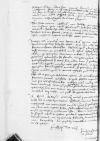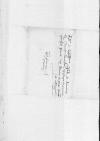Letter #3016
Cornelis DE SCHEPPER to Ioannes DANTISCUSBrussels, 1546-11-28
English register:
In reply to Dantiscus’ letters of 15 June and 16 July about the student from Gdańsk kidnapped in Brabant, De Schepper reports that the deed was committed by people from Gdańsk, while the young man was not abducted in Brabant but deceitfully persuaded to travel to Sint-Truiden, a town in the estates of the Bishop of Liège [Georg of Austria] that border on Brabant. From there he was taken to Cologne but managed to get away in one piece. One of the perpetrators, the elder son of a bookseller, has already been punished. His brother, a Gdańsk forger, will also be punished if he comes to the Low Countries under his own name.
De Schepper mentions that there are many suspicious individuals among people claiming to be merchants from Poland, Pomerania and the east: apostates, fugitives, exiles and Anabaptists. Despite this, merchants are treated kindly by the people of the Low Countries, as they were before the war, although they opposed the Emperor [Charles V]. De Schepper trusts that despite the influence apostates have in German towns, the Emperor will fulfil his plans.
De Schepper assures Dantiscus that any traveller who mentions him will be witness to his respectful memory of his friend.
He reports that things are calm in the Low Countries, though the Emperor’s opponents would like to ignite destruction. He does not describe the Emperor’s affairs because an envoy from Poland [Achatius von Zehmen] was at his court recently. The Polish, French, English and Venetians favour peace negotiations while – in De Schepper’s view – today it is deeds that count and not diplomatic missions. No news of Dantiscus has reached De Schepper.
De Schepper informs Dantiscus of rumours that the Emperor’s opponents are inciting many rulers to oppose the Emperor, but the subduing of previous rebellions demonstrates that such behaviour is risky. He derides this kind of idea.
De Schepper encourages Dantiscus to work towards preserving and improving the old customs and form of Christian religion in the territories under his supervision [Royal Prussia]. He warns him against the ruinous influence of his neighbours [Ducal Prussia and the Duchy of Pomerania] in this regard.
De Schepper sends Dantiscus letters from his friends, including the Bishop of Liège. He explains the breaks in his correspondence by noting the duties he is burdened with in these turbulent times. He sends Dantiscus greetings also from his wife, children and friends.
| received Heilsberg (Lidzbark Warmiński), 1547-02-04 Manuscript sources:
Prints:
| ||||||||||||||
Text & apparatus & commentaryPlain textText & commentaryText & apparatus
Reverendissimo et excellentissimo Praesuli et Domino, domino
Reverendissime et excellentissime Praesul, Domine et Pater ex animo honorande et observande.
Non possum ad litteras tuas de cf.
Quibus hactenus praestitum est a nobis, quicquid ante incoeptum istud bellum Germanicum fuit humanitatis, non aliter, quam si non stetissent contra partes
Si quisquam tuo nomine advenisset, dedissem operam, ut intellexisset tui memoriam apud me esse venerabilem. Qui casus accidit Gedanensi iuveni, posset aliis et prudentioribus contigisse. Evasit ille Dei gratia, adiuvante innocentia, neque in
Malorum et scelestorum hominum, quibus hoc tempore plerisque invitantibus causis plena sunt omnia, numquam deest seminarium, sive ex vobis, sive aliunde proveniat, sed inter bona, quae iis provinciis asscribi possunt, si qua modo sunt, certe animadvertitur iure in praedones publicorum itinerum.
Reliqua adhuc salva sunt, quamquam adversarios
De statu rerum
Vulgo feruntur cursitare adversarii
Haec ad te pro mea libertate, optime et pientissime pater, futurorum ignarus perscribo. Si quid potes in regionibus tuis, quo res Christiana stet antiquo ritu modoque, enitere, nam nova haec etiam, si quaedam vetera, emendatione egeant. Periculosa sunt tam vicinis atque imminentibus malorum conatibus, atque ausis, ne quid de opinionibus dicam.
A
Bene et recte vale, et si quid apud te habent ponderis apprecationes et commendationes amicorum, ne
Eiusdem Reverendissimae Dominationis Vestrae humilis inservitor et filius
[1 ] The same day, 1547-02-04, Dantiscus also received a letter from Karel Utenhove written in September (cf.


